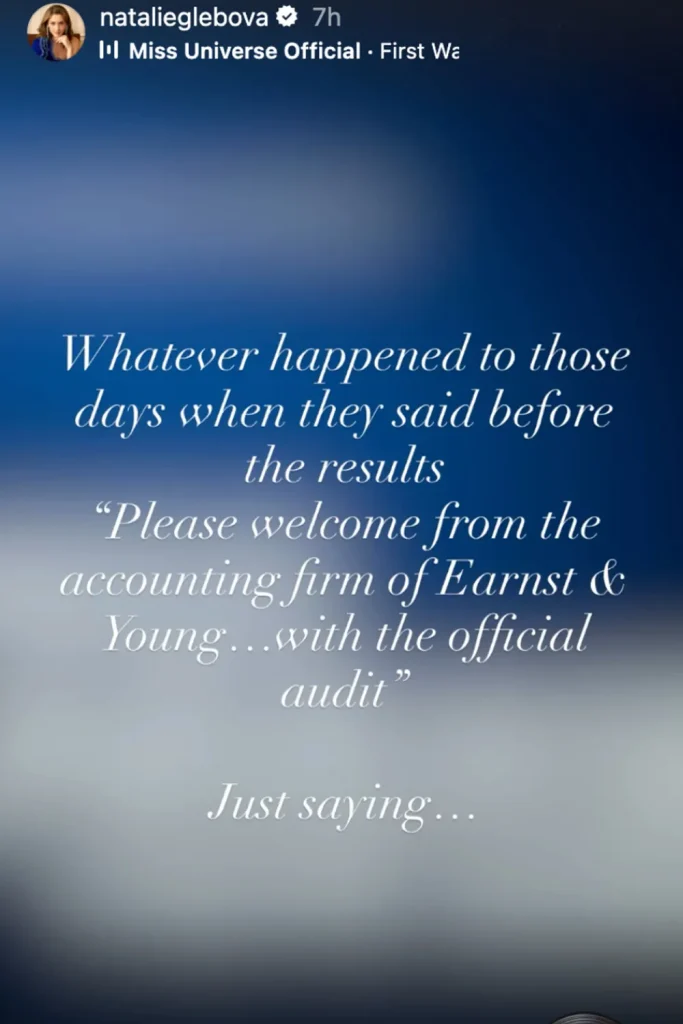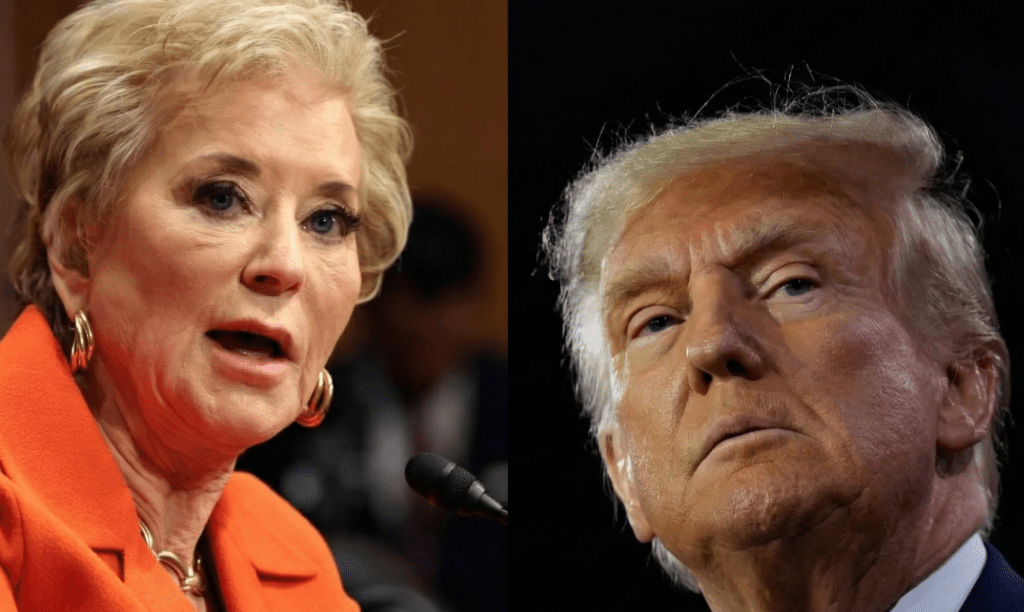Miss Universe Judge Says Another Contestant “Should Have Won,” Fueling Fresh Outrage Over Alleged Rigged Voting Just Hours After Crowning
The Miss Universe pageant is no stranger to debate, but this year’s controversy ignited faster than anyone could have predicted. Just hours after the new winner was crowned, one of the competition’s own judges appeared to question the legitimacy of the final results — setting off a wave of confusion, disappointment, and growing outrage among fans who were already buzzing about the fairness of the scoring. Her comments didn’t come through an official statement or a formal press conference. Instead, they surfaced online in real time, where a single sentence was enough to trigger a full-blown firestorm around one of the world’s most-watched beauty competitions.

The uncertainty began quietly. Pageant watchers noticed that the energy backstage felt unusually tense after the live broadcast ended. Even before the judge’s remarks surfaced, social media was humming with speculation. Supporters of different contestants were already dissecting the results, reviewing camera angles, rewatching final questions, and analyzing the judges’ reactions with forensic precision. But everything shifted when one Miss Universe judge publicly hinted that the contestant she believed was the strongest didn’t win — and that something “felt off” about how the final rankings unfolded.
Her comment, brief but unmistakably clear, immediately raised questions: Was she suggesting the voting had been influenced? Was she implying that the scoring system was flawed? Was this sourness after a disappointing personal preference — or a real, internal concern about transparency?
According to the judge, who spoke shortly after the broadcast, one contestant delivered a performance that she believed exceeded the rest. She praised her composure, stage presence, intelligence, and consistency across all categories. She noted that this contestant stood out not just in the evening gown presentation or the swimsuit walk, but throughout the interviews, where personality and depth often become the deciding factors. The judge didn’t name a country or a person directly in her initial remarks, but her phrasing strongly suggested she believed the rightful winner had been overlooked.

Within moments, fans matched her comments to finalists they believed fit the description, and discussions exploded across multiple platforms. Some insisted that the competition had been fair and that the winner earned her crown without question. Others said they felt “validated” by the judge’s remarks, which aligned with their own suspicions. The debate grew louder when fans pointed out inconsistencies in the televised score breakdown and reactions from other judges during the final announcement.
Miss Universe has always prided itself on transparency, especially in recent years when pageants worldwide faced scrutiny over fairness, inclusivity, and evolving cultural standards. But even with updated voting systems and public scoring explanations, pageants remain vulnerable to accusations of bias — whether rooted in national loyalty, industry politics, or shifting brand strategies. This year’s controversy appears to sit at the intersection of all those concerns.
The judge’s comment didn’t directly accuse anyone of wrongdoing, but the phrasing — especially her choice of words like “should have won” — implied that the outcome didn’t match the performance she witnessed. And when a judge expresses that kind of doubt, fans listen closely.

Sources close to the event said judges submitted their scores individually and electronically, with no group discussion influencing the totals. The Miss Universe Organization has emphasized in the past that its system prevents manipulation by ensuring each judge’s score is weighted equally and processed automatically. However, like many live competitions, the process isn’t fully visible to the audience, and transparency only goes so far. Once a judge suggests dissatisfaction with the outcome, even without concrete evidence, it stirs a level of suspicion that is difficult to contain.
Several pageant analysts noted that the judge’s reaction may have stemmed from the emotional intensity of the evening. Judges sometimes develop strong impressions during rehearsals or early rounds and may feel thrown off when live scoring produces a different final order. They also point out that the judges’ table sees things the cameras don’t: subtle stage details, eye contact, the contestant’s confidence, or faltering moments that audiences at home miss.
Still, this particular judge’s comments carried more weight than typical backstage chatter. Her words spread rapidly because they came at a fragile moment — when the new winner was still celebrating her crown and when rival fanbases were still processing the outcome. The timing created a near-instant ripple effect, one that made headlines around the world and forced the Miss Universe community to confront the uncomfortable possibility of internal disagreement.

In the hours that followed, the judge clarified that she wasn’t accusing the organization of wrongdoing, but simply expressing her belief that another contestant’s performance exceeded expectations. But by then, the conversation online had evolved far beyond her intentions. Some fans interpreted her comments as confirmation of rigging. Others accused her of disrespecting the crowned winner. A smaller group said her transparency was refreshing — that pageants, like any judged competition, deserve honest critique from within.
While the Miss Universe Organization has not publicly addressed the judge’s remarks, insiders say leadership is aware of the backlash and is monitoring the reaction closely. Historically, pageants have been cautious about involving judges in public commentary after the broadcast, but social media has made that boundary much harder to control. In an age where instant communication is expected, judges have platforms that reach millions, and one unscripted remark can spark a global debate within seconds.
Meanwhile, the newly crowned Miss Universe has remained gracious and composed throughout the controversy. She has not responded directly to the judge’s comments, choosing instead to focus on expressing gratitude for her supporters, her mission, and her upcoming responsibilities. Pageant veterans praised her for maintaining professionalism despite the distraction — a quality that often distinguishes exceptional titleholders.

The contestant who was implied to have been “robbed” has also stayed silent publicly, though many of her fans are expressing frustration and disappointment online. Supporters describe her as the most consistent, most prepared, or most charismatic of the night. Some even claim her answers in the final round were stronger than the winner’s. The outpouring of support has been intense, with hashtags emerging across multiple countries calling for greater transparency in the scoring process.
Pageant experts have warned that this controversy risks overshadowing the accomplishments of all finalists, not just the new titleholder or the contestant named by the judge. Every woman on that stage trained for months — sometimes years — preparing for the moment of competition. They faced language barriers, cultural differences, tightly scheduled rehearsals, and high-pressure interviews. To reduce their efforts to a single disputed ranking, experts say, does a disservice to the global nature of the event.
Still, controversies like these are not new. Miss Universe has faced questions in previous years about scoring procedures, political favoritism, and sponsor influence. Each time, the organization has reaffirmed the integrity of its process and pointed to the long-standing professionalism of its judging panels. And while the debate eventually fades, the scrutiny remains.
This year’s situation is unique in that the criticism originated inside the judging panel itself. Even if the judge’s words were based purely on personal preference, not accusation, they carry a force that external speculation never could. Fans see judges as insiders with exclusive knowledge, and a statement like hers naturally fuels theories that something deeper happened behind the scenes, whether true or not.
As the conversation continues to evolve, experts say this incident may prompt the Miss Universe Organization to refine its communication strategy moving forward. Some suggest stricter limits on judges’ public comments following the event. Others believe that more transparency — potentially revealing full scoring matrices or judge-by-judge breakdowns — could ease long-term concerns. But the organization must balance that transparency with fairness, privacy, and the professionalism expected in global competitions.
For now, the moment sits in a space of uncertainty — a mix of honest emotion, fierce fan loyalty, and the delicate politics of international pageantry. The judge’s remarks may have been an impulsive reflection or a carefully considered opinion, but their impact is undeniable. They have reminded the world that beauty pageants, for all their glamour and symbolism, are judged by humans. And humans bring emotion, perspective, and bias — even when they strive for objectivity.
In the end, the new Miss Universe is expected to fulfill her role with grace, representing her country and the organization on a global stage. The runner-up and other finalists will continue building their paths, many of which lead to successful careers beyond the pageant world. And the judge at the center of this controversy will likely face questions about her comments for weeks to come. But the heart of the debate remains unchanged: a clash between expectation and outcome, passion and procedure, belief and reality.
One remark created an earthquake, but as with most pageant controversies, time will smooth its edges. What remains now is a conversation about fairness, transparency, and the enduring power of public opinion — a conversation the Miss Universe Organization may have no choice but to confront in the months ahead.



